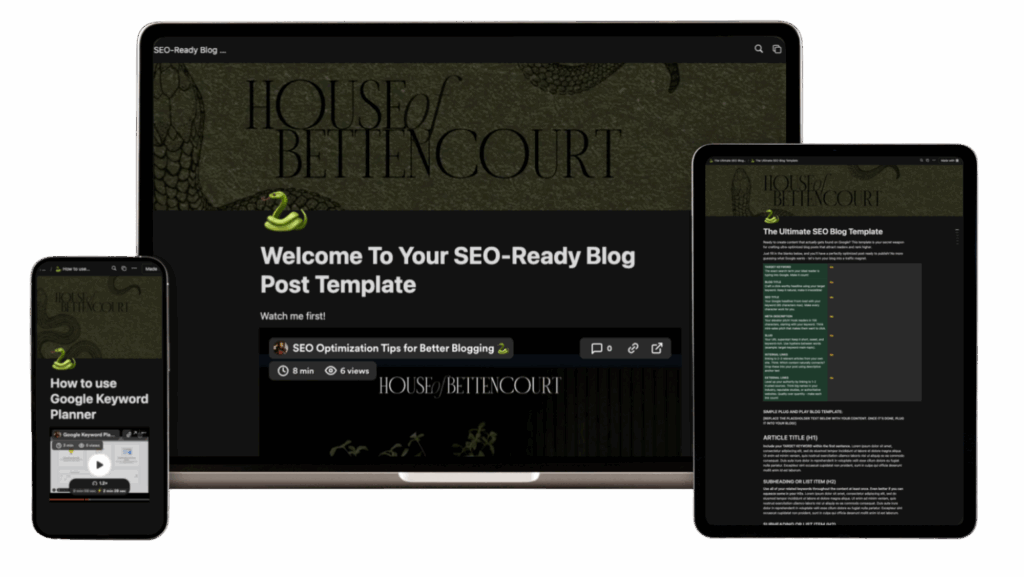Web strategist who helps creatives and service providers build websites designed to grow with them. Unlike other designers, I don’t just build for launch—I create strategic, scalable sites that stay valuable long after day one.
OH HEY!! I'M CHANTEL
Quick Answer: E-E-A-T stands for Experience, Expertise, Authority, and Trustworthiness, Google’s framework for evaluating content quality and your blog’s credibility.
Now let me tell you why this matters for your small business blog and what you can actually do about it.
I’ve been writing and optimizing blogs for small businesses since 2019. In that time, I’ve watched Google’s algorithm updates wreak havoc on perfectly good blogs that were simply missing one thing: clear demonstrations of E-E-A-T.
I see this all the time with service provider websites.
Therapists writing thoughtful mental health content. Financial advisors sharing solid investment advice. Business coaches offering great strategies. Some don’t blog at all. Others copy and paste their Instagram captions. Some stick to purely informational content. But here’s what almost all of them are missing: clear demonstrations that they’re actually qualified to give this advice. The credentials exist—they’re just invisible to both Google and potential clients.
That’s the power of E-E-A-T for small business blogs.

What Is E-E-A-T? The Framework Explained
E-E-A-T stands for Experience, Expertise, Authority, and Trustworthiness. It’s Google’s framework for determining whether your content should rank in search results.
Google added the first “E” for Experience in December 2022, making it E-E-A-T instead of just E-A-T. This addition emphasized something crucial: firsthand experience matters as much as formal credentials.
Experience: Firsthand Knowledge That Matters
Experience means you’ve actually done what you’re writing about. Not just researched it or read about it elsewhere. You’ve lived it, worked with it, or have direct knowledge of it.
For a small business blog, this might look like a realtor writing about what it’s really like to help clients downsize, a business coach sharing lessons from building their own business, or a web designer explaining mistakes they’ve made and learned from.
Google can identify when content comes from genuine experience versus generic advice cobbled together from other sources. Personal stories, specific details, and unique insights signal experience.
Expertise: Knowledge and Skill in Your Field
Expertise demonstrates that you know your subject deeply. This can come from formal education, certifications, years of practice, or specialized training.
A financial advisor writing about retirement planning should mention their certifications. A therapist discussing mental health should reference their license and training. A marketing consultant should showcase results they’ve achieved for clients.
Authority: Recognition and Credibility in Your Industry
Authority is different from expertise. Expertise is what you know. Authority is whether others recognize and respect what you know.
Building authority involves getting backlinks from reputable sites in your industry, being cited or mentioned by other credible sources, having positive reviews and testimonials from real clients, guest posting on established platforms, and speaking at industry events or on podcasts.
Authority isn’t something you declare. It’s something others confer on you through their recognition and references.
Trustworthiness: The Foundation of Everything
Trustworthiness is the most important element. You can have experience, expertise, and authority, but if your site isn’t trustworthy, none of that matters.
For small business blogs, trustworthiness includes using HTTPS, having clear contact information, including a privacy policy, displaying accurate fact-checked information, being transparent about who you are and what you do, and responding to comments authentically.
Why E-E-A-T Matters Specifically for Small Business Blogs
You might be thinking, “I’m not a huge corporation or a medical site. Does E-E-A-T really apply to my small business blog?”
Absolutely yes. Here’s why.
When someone searches for information related to your industry, your blog posts are competing with content from established publications, large companies with big marketing budgets, and authority sites that have been around for years.
E-E-A-T is how small business blogs can compete despite fewer resources. You might not have the budget for massive link-building campaigns, but you have something big brands don’t: genuine, firsthand experience with your specific niche and real relationships with your clients.
A local bakery owner writing about sourdough starter troubleshooting has more credibility than a generic food blog rehashing information from other sources. That’s E-E-A-T working in your favor.
Google’s recent algorithm updates have increasingly emphasized “helpful content” created by real people with real experience. AI-generated generic content is being devalued. Small business blogs written by actual business owners with genuine expertise are exactly what Google wants to rank. But only if you make that expertise and experience visible.
Common E-E-A-T Mistakes I See on Small Business Blogs
After optimizing dozens of small business blogs for E-E-A-T, I’ve noticed the same mistakes repeatedly.
Missing Author Information: Many small business blogs have no author attribution. There’s no indication of who wrote the content or why they’re qualified to write it. Even if you’re the only person writing your blog, add author information with credentials.
Weak About Pages: Your about page should clearly state who you are, what qualifies you to give advice in your field, and what experience you bring to the table. Answer: Why should someone listen to you? What makes you qualified?
No Credentials Mentioned: If you have relevant credentials, certifications, degrees, or years of experience, mention them. A business coach should mention they’ve built successful businesses. A nutritionist should reference their certifications.
Generic Content: Blog posts that could have been written by anyone about anything don’t demonstrate E-E-A-T. Share specific examples from your work. Include lessons you’ve learned. Reference challenges you’ve helped clients overcome.
No External Validation: If you never get mentioned, linked to, or reviewed by anyone, Google has no external validation of your authority. Work on getting backlinks, encouraging client reviews, and building relationships in your industry.
How to Improve E-E-A-T on Your Small Business Blog
Now let’s get practical. Here’s exactly how to strengthen E-E-A-T for your small business blog.
Create Comprehensive Author Bios
Every blog post should have clear author attribution with a bio that establishes credentials and experience. Include your name and professional title, relevant credentials or certifications, years of experience, specific expertise areas, and a link to your full about page or LinkedIn profile.
Example: “Sarah Martinez is a licensed financial advisor with over 12 years of experience helping families plan for retirement. She holds her CFP certification and has been featured in Money Magazine and The Wall Street Journal.”
Strengthen Your About Page
Your about page should include your background and how you got into your field, relevant education and certifications, years of experience and specializations, notable achievements or recognition, what makes your approach unique, and contact information.
Add Experience-Based Content to Every Post
Generic advice doesn’t demonstrate experience. Specific examples, personal stories, and lessons learned do.
Instead of: “Small businesses should focus on their ideal client.”
Try: “When I started my web design business, I said yes to everyone. That led to working with clients who didn’t value my expertise and projects that drained my energy. Now I only work with creative service providers, and my business is more profitable and enjoyable.”
Include Your Credentials Throughout Your Content
Don’t wait until the author bio to mention you’re qualified. Weave credentials naturally into your content: “In my 15 years as a therapist, I’ve noticed…” or “After building three successful e-commerce businesses…”
Link to Reputable Sources
When you make claims or reference data, link to authoritative sources like government websites, educational institutions, established industry publications, and research studies. This shows you’re basing your advice on reliable information.
Showcase Client Results and Testimonials
Real testimonials from real clients demonstrate that you’ve actually helped people. Include relevant client quotes throughout your blog posts when they support your points. Make sure testimonials are specific and include names with permission.
Build Backlinks from Relevant Sites
Getting other reputable sites to link to your content is one of the strongest signals of authority. Write guest posts for established sites in your industry, create original research that others want to reference, get featured in industry roundups, participate in podcasts, and build genuine relationships with other professionals.
We’ve covered this in depth in our blog about increasing online brand visibility, which includes specific strategies for getting featured on other platforms.
Ensure Your Site Is Secure and Professional
Your site should use HTTPS, load quickly, work properly on mobile devices, have clear navigation, include complete contact information, display a privacy policy, and avoid excessive ads or pop-ups. A professional, well-maintained site signals that you take your business seriously.
Keep Content Updated and Accurate
Outdated information damages your E-E-A-T. Regularly review and update your most important blog posts with current statistics, examples, and recommendations. Add an “Updated: [Date]” note when you refresh content. Use Google Search Console to monitor which of your posts are gaining traction and identify content that might need updating.
Be Transparent About Your Business
Trustworthiness requires transparency. Be clear about who you are and what you do, where you’re located, how to contact you, any affiliations or sponsorships, and your business practices.
This ties directly back to what we discussed in our blog about authentic business voice and standing out from competitors. Being genuinely yourself is part of building trustworthiness.
E-E-A-T for Different Types of Small Business Blogs
How you demonstrate E-E-A-T will vary depending on your industry and audience.
Service Provider Blogs (Therapists, Coaches, Consultants)
Emphasize professional licenses and certifications, years of experience and specializations, client success stories and case studies, your unique approach or methodology, and relevant training.
Local Service Business Blogs (Realtors, Contractors, Salons)
Emphasize years serving your specific community, local knowledge and insights, reviews from local clients, community involvement, and before-and-after examples from local projects.
The realtor blog we discussed in our post about personal blogging for business owners is a perfect example. She demonstrates local expertise by writing about specific neighborhoods and area-specific considerations.
Creative Business Blogs (Designers, Photographers, Artists)
Emphasize portfolio of past work, client testimonials about results, awards or recognition, process and approach, and behind-the-scenes insights.
E-commerce and Product-Based Businesses
Emphasize product expertise and sourcing, customer reviews and ratings, return policies and guarantees, manufacturing or creation process, and brand story and values.
How E-E-A-T Connects to Your Overall Content Strategy
E-E-A-T isn’t a separate SEO tactic. It’s woven throughout your entire content strategy and business presentation.
One thoroughly researched, experience-based blog post with clear author credentials and reputable sources will outperform ten thin, generic posts every time. Don’t sacrifice quality for publishing frequency.
Remember how we talked about the benefits of having a personal blog alongside your business content? This directly supports your E-E-A-T. When you share personal experiences, behind-the-scenes insights, and authentic stories about your business journey, you’re demonstrating experience in a way that purely service-focused content can’t.
Being genuinely yourself in your content—something we covered extensively in our blog about authenticity helping you stand out from competitors—is crucial for the trustworthiness component of E-E-A-T. Authentic voice, genuine insights, and real personality build trust in ways that polished corporate speak never can.
The Long-Term Benefits of Strong E-E-A-T
Improving E-E-A-T isn’t a quick fix. It’s a long-term investment in your blog’s credibility and your business’s online reputation.
Blogs with strong E-E-A-T tend to weather Google algorithm updates better than those without. When Google updates its ranking systems, they’re generally looking to reward quality content from credible sources.
Authority builds on itself. As you publish more quality content, earn more backlinks, get more recognition, and accumulate more positive reviews, your overall authority strengthens.
When someone finds your blog, reads several posts, sees your credentials, and understands your experience before ever contacting you, they start the relationship already trusting you. This leads to better client relationships, easier sales conversations, and clients who are more likely to follow your advice and refer others.
Ready to Stop Worrying About Google Rankings?
Understanding E-E-A-T is one thing. Actually implementing it consistently while running your business? That’s where it gets challenging.
If you’re tired of trying to figure out how to write blog posts that demonstrate expertise while also optimizing for SEO, I get it. That’s exactly why I offer done-for-you monthly blogging retainer services. I handle the research, writing, optimization, and E-E-A-T implementation so you can focus on what you do best – running your business and serving your clients.
LEARN ABOUT MONTHLY BLOGGING SERVICES
Not quite ready for done-for-you blogging? No worries! Start with my free SEO-Ready Blog Post Template. It’ll walk you through creating optimized blog posts that actually rank and convert.
DOWNLOAD FREE SEO BLOG TEMPLATE

Looking for more tips? Join my weekly newsletter, The House Blend—the only wake-up call you’ll actually look forward to. Packed with web wisdom, SEO tips, and creative ideas.
Join my email list “The House Blend
Ways you can work with me:

What Is E-E-A-T and Why Your Small Business Blog Needs It
Web strategist who helps creatives and service providers build websites designed to grow with them. Unlike other designers, I don’t just build for launch—I create strategic, scalable sites that stay valuable long after day one.
OH HEY!! I'M CHANTEL